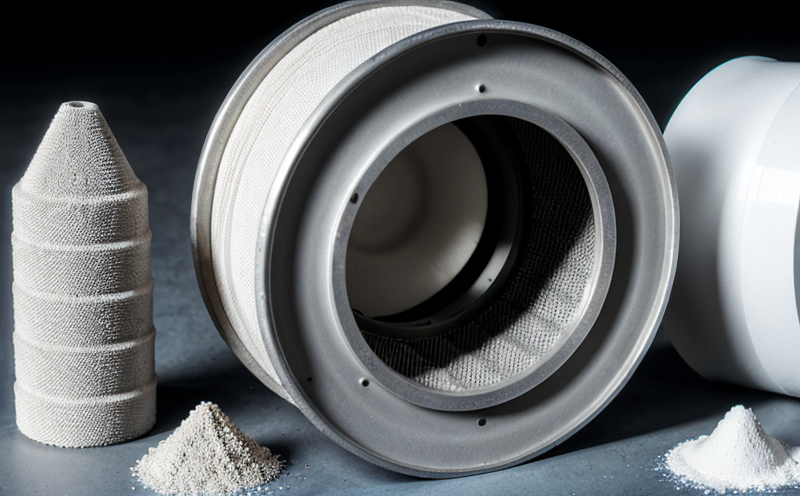IMO SOLAS Certification Testing of Marine Equipment
The International Maritime Organization (IMO) and the Safety of Life at Sea Convention (SOLAS) set stringent standards to ensure that marine equipment, including components used in ships, comply with global safety regulations. This service focuses on providing comprehensive testing for additive manufacturing materials used in marine equipment, ensuring they meet the rigorous requirements established by the IMO SOLAS conventions.
Our expertise lies in the integration of modern additive manufacturing (AM) technologies into the production cycle of critical maritime components. With advancements in AM, there is an increasing need to ensure that these innovative materials and processes are safe and reliable for use in marine environments. This service ensures compliance with IMO SOLAS regulations by validating the structural integrity and performance characteristics of additively manufactured parts.
The process begins with a thorough understanding of the material specifications and design requirements provided by our clients. We then proceed to fabricate specimens using state-of-the-art AM technologies, closely adhering to the standards outlined in ISO 5290, which governs additive manufacturing processes and production quality assurance systems for three-dimensional parts.
Once fabricated, these specimens undergo rigorous testing to evaluate their mechanical properties, such as tensile strength, fatigue resistance, impact toughness, and corrosion resistance. Testing is conducted using equipment that adheres to ASTM E8, ASTM E1299, and EN 1057 standards, ensuring accurate and reliable results.
Our testing protocols are designed to replicate real-world conditions that marine equipment might encounter during operation. This includes exposure to saltwater environments, high-pressure systems, and extreme temperature variations. Our lab facilities are equipped with state-of-the-art instruments capable of simulating these harsh conditions, providing realistic data on the performance of additively manufactured components.
The testing process is followed by detailed analysis and reporting, where we provide comprehensive insights into the test results. This includes not only the mechanical properties but also any potential flaws or weaknesses in the material structure that could impact its long-term reliability. Our reports are meticulously prepared to meet the stringent requirements of IMO SOLAS conventions, ensuring that our clients have all the necessary documentation for certification.
The significance of this service cannot be overstated. Not only does it ensure compliance with international maritime regulations, but it also enhances the safety and efficiency of marine operations worldwide. By leveraging cutting-edge AM technologies and adhering to the highest standards of quality assurance, we contribute to the ongoing improvement in maritime safety and sustainability.
Scope and Methodology
The scope of this service encompasses a wide range of additive manufacturing materials used in marine equipment. This includes but is not limited to titanium alloys, stainless steel grades, and nickel-based superalloys. The methodology involves several key steps:
| Step | Description |
|---|---|
| Material Selection | Selecting the appropriate material based on design requirements. |
| Model Designation | Designating models for additive manufacturing processes. |
| Manufacturing Process | Executing AM using specific technologies like laser powder bed fusion (LPBF). |
| Post-Processing | Performing necessary heat treatments and surface finishing. |
The testing methodology follows internationally recognized standards to ensure accuracy and reliability. This includes:
- ISO 5290: Additive Manufacturing Processes and Production Quality Assurance Systems for Three-Dimensional Parts.
- ASTM E8: Standard Practice for Tension Testing Metallic Materials.
- ASTM E1299: Standard Test Method for Determining Fatigue Limit of Metallic Materials by Endurance Testing.
- EN 1057: Structural Steels for Shipbuilding and Related Purposes.
Eurolab Advantages
Our lab offers a range of advantages that set us apart in the field of IMO SOLAS certification testing:
- State-of-the-Art Facilities: Our laboratories are equipped with advanced equipment and technologies that can simulate real-world conditions, ensuring accurate and reliable test results.
- Expertise and Experience: Our team comprises highly skilled professionals with extensive experience in marine engineering and additive manufacturing.
- Comprehensive Testing Capabilities: We offer a wide range of testing services to cover all aspects of material performance, ensuring full compliance with IMO SOLAS regulations.
- Prompt Reporting: Our clients receive detailed reports within the shortest possible time frames, facilitating quick decision-making processes.
These advantages ensure that our clients can trust us to deliver accurate and reliable results every time. We pride ourselves on maintaining high standards of quality and integrity in all our services.
Quality and Reliability Assurance
- Accreditation: Our lab is fully accredited to ISO/IEC 17025 standards, ensuring the highest level of quality assurance.
- Standard Compliance: We strictly adhere to international standards such as ISO 9001 for quality management systems and ISO 14001 for environmental management systems.
To maintain these high standards, we implement a robust quality control system that includes:
- Material Traceability: Ensuring full traceability of all materials used in testing.
- Data Accuracy: Implementing rigorous data validation and verification processes to ensure accuracy.
- Continuous Improvement: Regularly updating our procedures based on feedback from clients and industry best practices.
These measures are crucial for maintaining the reliability and integrity of our testing services, ensuring that we consistently meet or exceed expectations set by international standards.





